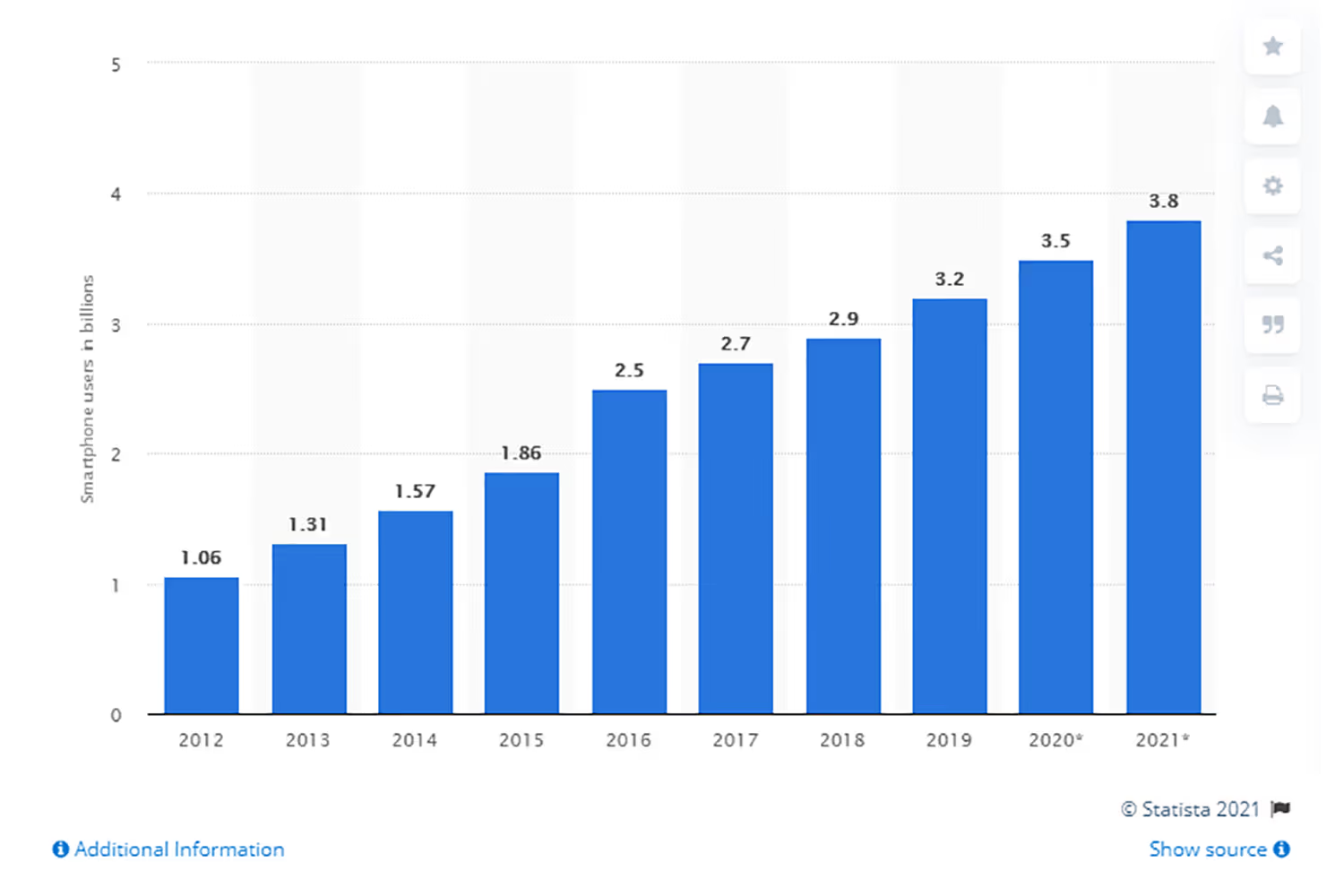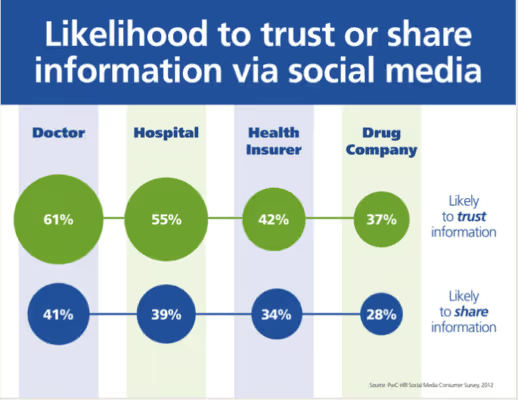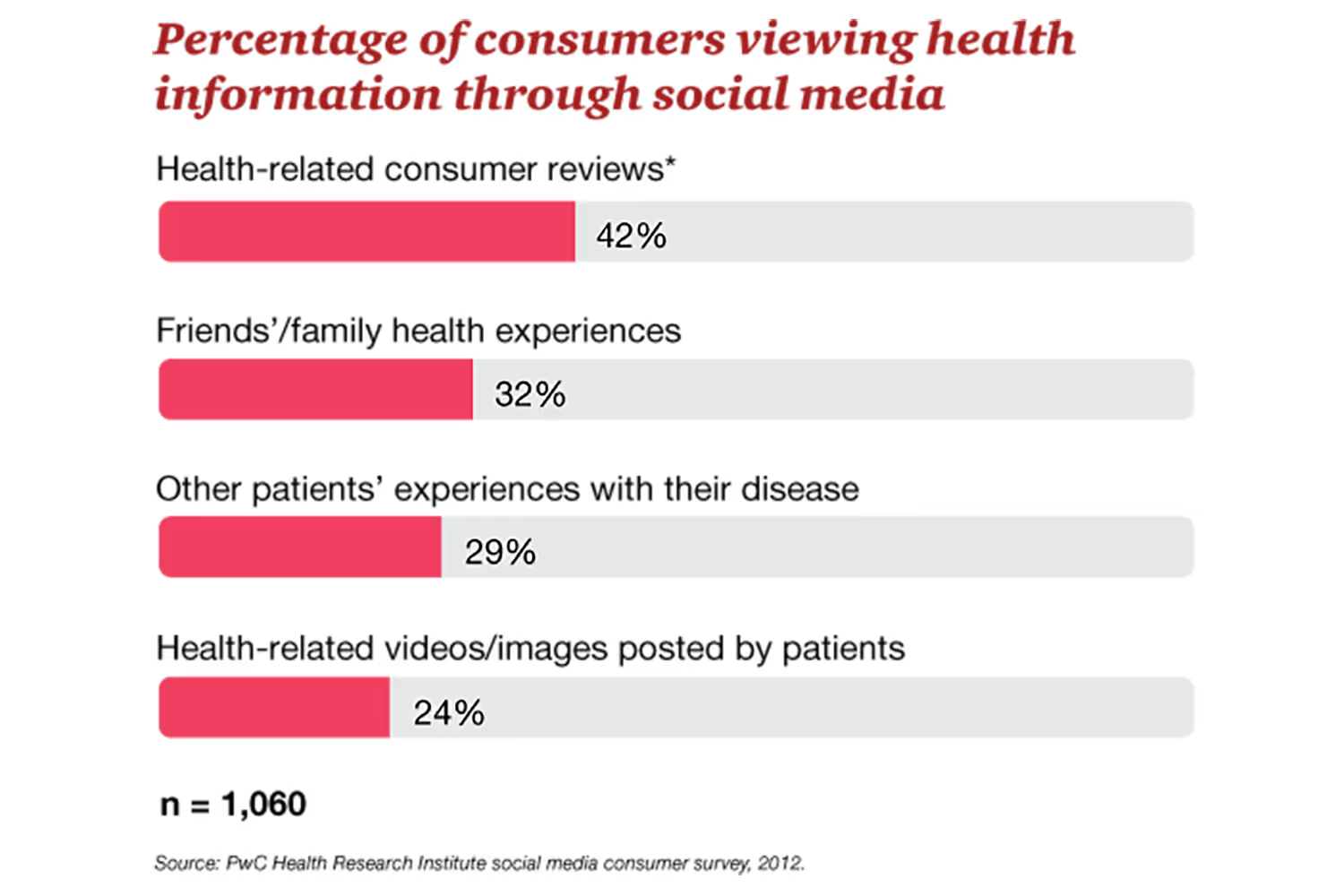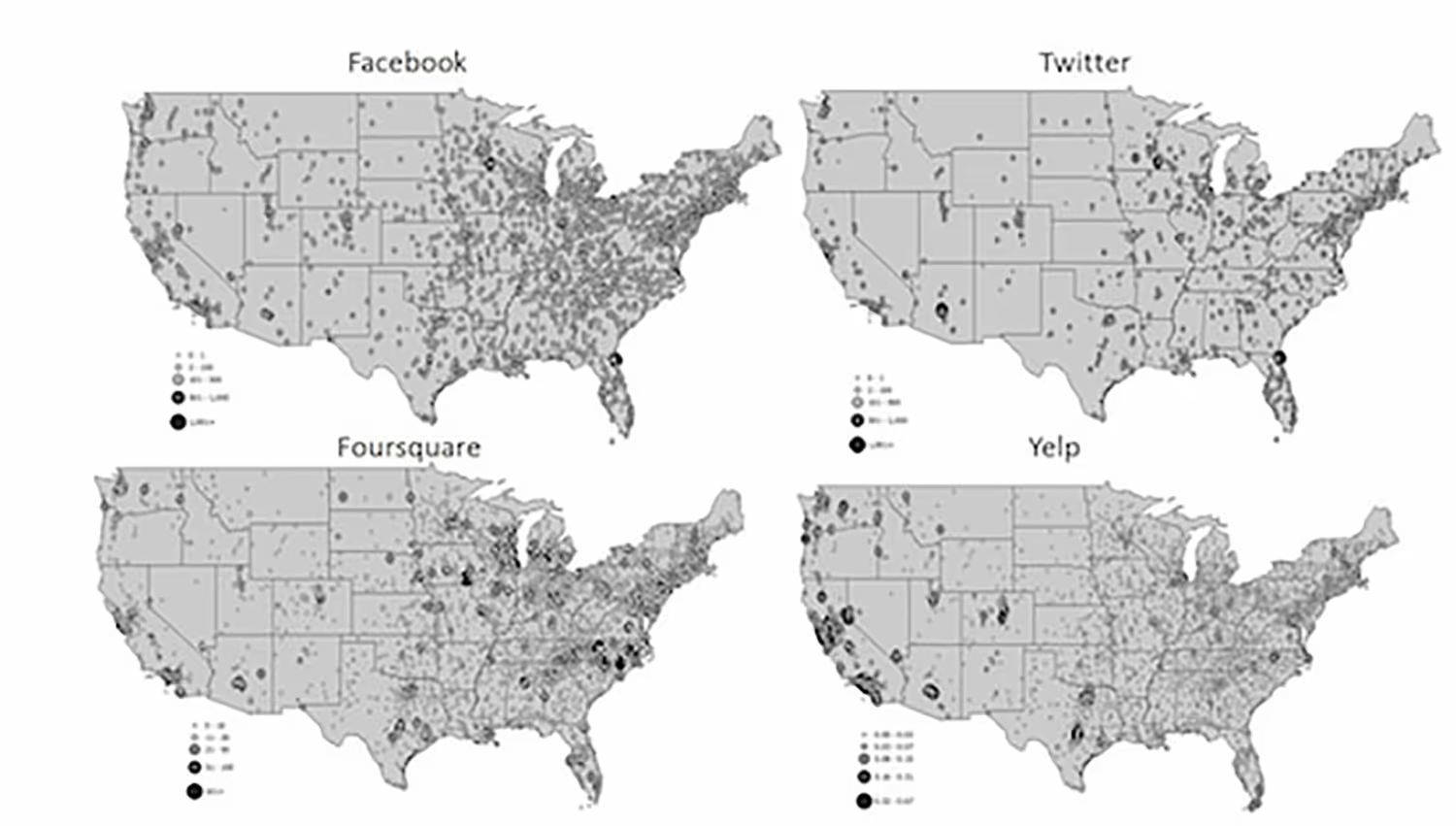50+ Social Media and Healthcare Statistics You Need to Know
Doctors now recognize the importance of connecting with consumers online. They’ve started using popular sites like YouTube, TikTok, and Instagram. Here are over 50 social media and healthcare statistics you should know about these platforms.

If I had to guess, you probably own a smartphone. There’s also a good chance that, if you do own one, you’re reading this blog post on it. If you don’t, you know that you’re in the minority. It’s only a matter of time before you get one.
The popularity of these smart devices is growing since they have easy access to the internet. Being able to search for anything from anywhere, and at any time, makes it so convenient to find what we need.

As the trend for owning these mobile internet devices increases, so does the use of social media. We can connect with others, search for content, find answers to questions, shop for products, and so much more with these platforms. Because of the simplicity to reach targeted audiences, it’s no surprise that these channels are starting to gain popularity within the healthcare space.
Doctors recognize the importance of connecting with consumers online. They’ve started using popular sites like YouTube, TikTok, and Instagram.
Of course, there are challenges when it comes to using these platforms as a healthcare practice. Staying compliant, building trust, and choosing the best topic and platform all come to mind. Here are over 50 social media and healthcare statistics that show this.
Compliance and Trust
One of the challenges with this technology is the possible legal ramifications. As a medical practice, you know the importance of staying HIPAA compliant. Online platforms come with extra security risks. Unfortunately, social media can lead to HIPAA violations if the staff doesn’t follow necessary guidelines.
One of the best ways to ensure your team knows how to avoid these violations is by having a social media policy. This gives them a set of rules to follow so they don’t accidentally cause a breach. Surprisingly, if a medical facility has one of these policies, they’re in the minority.
Because of the sensitivity of their data, some patients don’t trust using web platforms to share information. But even if they don’t trust sharing their details, they may still trust what they find online.
- As of 2018, ProPublica had uncovered 47 HIPAA violations on social media since 2012. There were likely more that weren’t discovered or reported. (HIPAA Journal)
- Only 31% of medical facilities have social media guidelines in writing. (Medical Billers and Coders)
- 23% of pharmaceutical companies don’t have policies to address data security and privacy when it comes to social media. (Applied Clinical Trials)
- The likelihood to trust or share information on these channels depends on who the person is sharing it with. 61% of people are likely to trust a doctor, and 41% are likely to share with a doctor. But only 37% are likely to trust a drug company, and 28% are likely to share with one. (Healthcare Success)

- 53% of Americans say they’re uncomfortable with medical data getting collected by online companies. (Okta)
- Only 8% of US adults over 50 years old would share their digitally-tracked health information on social media. (Statista)
- 90% of the younger group said they would trust health information shared on social media. (NCBI)
Patient Demographics and Desires
As you might expect, young people are more open to using social media for health reasons. They grew up in the age of technology so many of them even prefer it. While they’re more likely to discuss medical details online, other groups are just as likely to be searching for related information.
Certain groups use online channels more often depending on the topic they’re searching for. And people responsible for others, such as parents or caregivers, search health topics even more.
- Almost 90% of older users accessed popular social media sites to find and share health information. (JMIR Publications)
- People ages 18 to 24 are twice as likely to use social media to discuss health issues than people ages 45 to 54. (Harger Howe Advertising)
- A survey found how relevant health information on social media for different groups: (AAFP)
- 54% of Millennials and 42% of all adults want to be friends with/follow their doctor on social media
- 65% of Millennials and 43% of all adults think it’s appropriate to contact their doctor through social media with a concern
- 32% took a health-related action based on information they found on these platforms
- 15% of parents with children under 18 have self-diagnosed a health concern based on information they found on social media
- 68% of parents used social media for health information. (PubMed)
Topics of Interest
Out of all topics on the social web, health content gets frequent searches. And with so many different medical details online, people can search for so many topics.
Of course, some of these have more frequent searches than others. And like I already mentioned, certain groups look for particular topics more than others will.

- 80% of people on social media use it to search for health-related information. (Healthcare Compliance Pros)
- 42% of consumers on social media view health-related consumer reviews. 32% post about their friends’ or family’s health experiences. (PWC)
- 28% of health conversations on Facebook support a health-related cause. 16% share health-related videos or images. (Infographics Archive)

- The following groups are most likely to look online for information about hospitals and medical facilities (Pew Research):
- Caregivers
- Women
- People with a college degree
- People ages 34-45
- Parents with children living at home
- The most searched health topic from 66% of internet users is information about a specific medical disease or medical problem. (Pew Research)

How It Influences Patients
Using social media for health-related reasons doesn’t stop at just searching for content. The information that patients find online influences their health choices.
This could be something personal such as a diet change or fitness routine. It also may lead people to try treating their conditions on their own. Or it can have a bigger impact on their actual medical choices, such as their decision to see a doctor and who they decide to visit.
Regardless of the decision, the fact is that social media health content is changing how people take care of themselves.
- The most significant decision-making influences of social media are for seeking a second opinion (45%) and choosing a hospital or doctor (41%). (Becker’s Hospital Review)
- 63% of patients choose one provider over another based on a strong online presence. (Doctor.com)
- 60% of doctors say that social media improves the quality of care for patients. (Merritt Hawkins)
- 44% of patients who search for a hospital on their mobile devices schedule an appointment. (Think With Google)
- Almost 31% of physicians believe that it is not appropriate to search online information about patients. (Hindawi)
Best Platforms
I’ve mentioned that certain topics get more searches and particular groups look for those details more often. The platform that the content is on also plays a role in the likelihood of it reaching patients.
Facebook is one of the most popular because of the wide range of people who use it. It’s been around long enough for older generations to be familiar with it. This is helpful when trying to reach this group since they’re less likely to use social platforms.
Aside from the popular channels that you would first think of, mobile apps are also making a surge in healthcare. As smartphones become more popular, so do health-related apps. It’s easier to access information on-demand. These platforms also make it easy to provide credible details since many of them involve medical professionals to create.
- Adoption of social media varied across 3,371 hospitals. 50% used all four platforms. (Healthcare Success)
- 3,351 had a Facebook account
- 3,351 had a Foursquare account
- 3,342 had a Yelp account
- 1,713 had a Twitter account

- There are over 318,000 health apps available worldwide. If used across all diseases, the healthcare system could save $46 billion annually. (MindSea)
- The global mobile health (mHealth) apps market size was $12.4 billion in 2018. The projected annual growth rate is 44.7% from 2019 to 2026, reaching $236.0 billion. (Grand View Research)
- 74% of patients using mobile app wearables and other mHealth tools help them cope with and manage conditions. (Mobius MD)
- Medical app downloads increased by 30% in the US during its peak month of COVID-19 compared to January 2020. (Statista)
- Almost 70 percent of all U.S. physicians use the healthcare professional social platform, Doximity. (LeverageRX)

Usage by Doctors
Like anyone else, doctors find value in using social media. Along with using it for personal reasons, they use it professionally. As you’ve seen, there will always be people looking online for health details.
But this information isn’t always accurate which could be dangerous for people trying to find helpful sources. Luckily for doctors, patients are most likely to trust online medical content from them.
Because of this, it’s beneficial for doctors to use these platforms to appeal to patients. It makes it easier for people to find credible sources and quality care when they need it.
- A survey of over 4,000 physicians found that over 90% use social media for personal reasons and 65% use it for professional reasons. (NCBI)
- 51% of healthcare providers use these channels as a marketing tactic. (MM&M)
- 75% of medical professionals declined an invitation to become online “friends” with a client. (ACOG)
- The primary social media uses for 1800 hospitals (ResearchGate):
- Supplying information to a general audience (97%)
- Providing content about the entire organization (93%)
- Announcing news and events (91%)
- Furthering public relations (89%)
- Promoting health (90%).

Conclusion
More industries adopt social media as they recognize its significance for appealing to consumers. Healthcare is no exception. With so much medical content online, it’s no surprise that people are searching about this topic.
Unfortunately, it’s easy for patients to get confused about what’s credible and accurate. Even worse, they might avoid going to a doctor because of answers they find online.
But medical professionals know this, so they’re taking advantage of these channels to connect with patients. And thankfully, consumers are most likely to trust health information that comes from a doctor.
Emphasize your product's unique features or benefits to differentiate it from competitors
In nec dictum adipiscing pharetra enim etiam scelerisque dolor purus ipsum egestas cursus vulputate arcu egestas ut eu sed mollis consectetur mattis pharetra curabitur et maecenas in mattis fames consectetur ipsum quis risus mauris aliquam ornare nisl purus at ipsum nulla accumsan consectetur vestibulum suspendisse aliquam condimentum scelerisque lacinia pellentesque vestibulum condimentum turpis ligula pharetra dictum sapien facilisis sapien at sagittis et cursus congue.
- Pharetra curabitur et maecenas in mattis fames consectetur ipsum quis risus.
- Justo urna nisi auctor consequat consectetur dolor lectus blandit.
- Eget egestas volutpat lacinia vestibulum vitae mattis hendrerit.
- Ornare elit odio tellus orci bibendum dictum id sem congue enim amet diam.
Incorporate statistics or specific numbers to highlight the effectiveness or popularity of your offering
Convallis pellentesque ullamcorper sapien sed tristique fermentum proin amet quam tincidunt feugiat vitae neque quisque odio ut pellentesque ac mauris eget lectus. Pretium arcu turpis lacus sapien sit at eu sapien duis magna nunc nibh nam non ut nibh ultrices ultrices elementum egestas enim nisl sed cursus pellentesque sit dignissim enim euismod sit et convallis sed pelis viverra quam at nisl sit pharetra enim nisl nec vestibulum posuere in volutpat sed blandit neque risus.

Use time-sensitive language to encourage immediate action, such as "Limited Time Offer
Feugiat vitae neque quisque odio ut pellentesque ac mauris eget lectus. Pretium arcu turpis lacus sapien sit at eu sapien duis magna nunc nibh nam non ut nibh ultrices ultrices elementum egestas enim nisl sed cursus pellentesque sit dignissim enim euismod sit et convallis sed pelis viverra quam at nisl sit pharetra enim nisl nec vestibulum posuere in volutpat sed blandit neque risus.
- Pharetra curabitur et maecenas in mattis fames consectetur ipsum quis risus.
- Justo urna nisi auctor consequat consectetur dolor lectus blandit.
- Eget egestas volutpat lacinia vestibulum vitae mattis hendrerit.
- Ornare elit odio tellus orci bibendum dictum id sem congue enim amet diam.
Address customer pain points directly by showing how your product solves their problems
Feugiat vitae neque quisque odio ut pellentesque ac mauris eget lectus. Pretium arcu turpis lacus sapien sit at eu sapien duis magna nunc nibh nam non ut nibh ultrices ultrices elementum egestas enim nisl sed cursus pellentesque sit dignissim enim euismod sit et convallis sed pelis viverra quam at nisl sit pharetra enim nisl nec vestibulum posuere in volutpat sed blandit neque risus.
Vel etiam vel amet aenean eget in habitasse nunc duis tellus sem turpis risus aliquam ac volutpat tellus eu faucibus ullamcorper.
Tailor titles to your ideal customer segment using phrases like "Designed for Busy Professionals
Sed pretium id nibh id sit felis vitae volutpat volutpat adipiscing at sodales neque lectus mi phasellus commodo at elit suspendisse ornare faucibus lectus purus viverra in nec aliquet commodo et sed sed nisi tempor mi pellentesque arcu viverra pretium duis enim vulputate dignissim etiam ultrices vitae neque urna proin nibh diam turpis augue lacus.


.avif)

